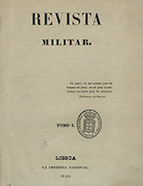

................................
It would be difficult to name a historian or scholar who has never consulted or cooperated, directly or indirectly, with the pages of this old publication, among whom we would highlight Manuel Themudo Barata (1918-2003), Gabriel do Espírito Santo (1935-2014), José Loureiro dos Santos (1936-), António Barrento (1938-), Luís Alves de Fraga (1941-), Carlos de Matos Gomes (1946-), António José Telo (1952-), Luís Miguel Duarte (1956-), Nuno Severiano Teixeira (1957-), or João Gouveia Monteiro (1958-), just to name a few, and military historiography is finding more and more expression among the historians of the new generations. Consequently, the Revista Militar intends to remain a privileged space for the dissemination of its research, hence the typology of its contributors also deserves to be studied, particularly those who reflected on historiographical thought, such as Damião Peres (1889-1976), Aníbal Pinto de Castro (1938-2010), Jorge Borges de Macedo (1921-1996), José-Augusto França (1922-), Joaquim Veríssimo Serrão (1925-), among other notable figures of essential reference.
Recalling the numerous endeavours of the Revista Militar in Portuguese intellectual life, it is worth mentioning the civic interventions in the context of the "Iberian Question", the disputes of support/opposition to republicanism, motivating controversies, but supporting an entrenched conviction in national independence and sovereignty. It was actively present at the 1st Colonial Military Congress (Porto, 1934), the Congress of the Portuguese World (Lisbon, 1940), the Congress on the History of Portuguese Scientific Activity (University of Coimbra, 1940), the 8th Centenary of the Recognition of the Right of the Portuguese State (1979), the Historical Congress on Guimarães and its Collegiate Church (1979), the celebrations of the 2nd Centenary of the Lisbon Academy of Sciences (1978-1980), among other scientific meetings and activities dedicated to National Defence and the Armed Forces, in cooperation with university research centres and other public, cultural, and scientific institutions.
This work is financed by national funds through FCT - Foundation for Science and Technology, I.P, in the scope of the projects UIDB/04311/2020 and UIDP/04311/2020.
